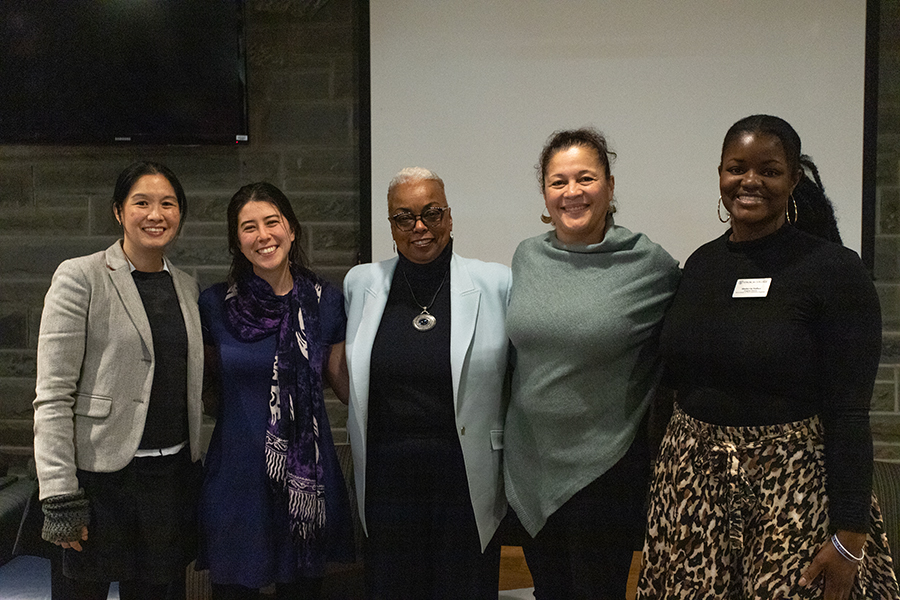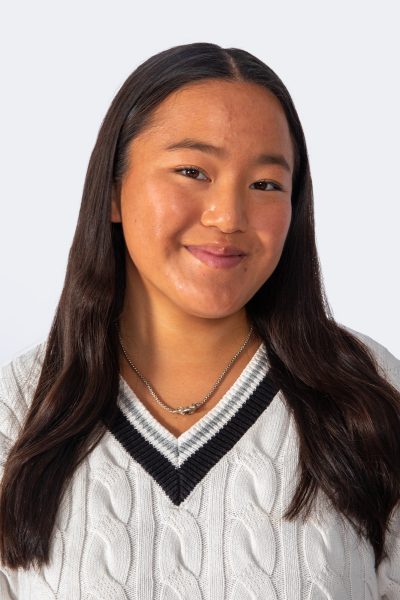As a part of Ithaca College’s Dr. Martin Luther King Jr. Celebration Week, Ithaca Firsts Mentor Program and the Student Leadership Institute co-hosted “Sharepoint Leadership Narratives: Empowering Journeys of Womxn of Color in Leadership (Leading in a Diverse World).” The event featured a panel of speakers Feb. 12 in Clark Lounge with about 35 attendees made up of both students and faculty.
The discussion was moderated by Shadayvia Wallace, program director of the MLK Scholars and First Generation Programs, and featured Mika Kennedy, assistant professor in the Center for the Study of Culture, Race, and Ethnicity; Te-Wen Lo, associate professor in the Department of Biology; Nicole Eversley Bradwell, executive director of Admission, and President La Jerne Cornish. The panel answered questions and gave advice about being women of color in leadership from their own lived experiences.
First-year student Marian Sanchez said she heard about the event from seeing posters on social media and from being a part of the Ithaca Achievement Program.
“I’m looking forward to hearing words of encouragement as a woman of color [able to study in college],” Sanchez said. “Because there are a lot of people who don’t get this opportunity.”
Wallace started the event by introducing the panelists and led the discussion by asking pre-planned questions which each panelist answered one by one.
Kennedy said that to be a leader is not solely about accomplishing a set goal or project but it also involves including others.
“Being a leader is putting a lot of time into figuring out how you’re going to bring other people with you,” Kennedy said. “It involves how you’re going to create an abundance by tapping into all of these other hundreds of people you might be able to bring into that project … that, in itself, I think is a skill, perhaps one unsung, and is certainly core to what it means to be a leader.”
Eversley Bradwell said that leadership is incredibly personal and that there is no one way to be a leader because everyone is shaped by their own experiences and skills.
“I think when I was younger, sometimes I was very critical of myself because I didn’t feel that my leadership matched others that I wanted to emulate. It’s taken me a while to figure out I don’t need to emulate someone else,” Eversley Bradwell said.
Eversley Bradwell said that being in predominantly white spaces for her whole career has required her to adapt to a type of mindset that involves developing authenticity in each professional role she has had.
“I have never in my career been in a space where I’m in the majority,” Eversley Bradwell said. “My perspective is always unique. My experience is always unique. And so trying to be in a place where I’m maybe bridging a gap and communicating in a way that I’m being authentic to myself but also exposing myself enough to others that we can work together as a team.”
Lo said her role as an educator leaves larger impacts with time, through smaller actions in the moment, especially now being in a place in her career where she can connect her past students to current students to further their opportunities.
“I’m more of a slow-release advocate as opposed to a fast-acting advocate,” Lo said. “What I want to leave behind professionally is a considerate community-minded next generation of scientists who would then go and do the high-impact science that would change the world. I see myself as an advocate in small steps on a daily basis every time I talk about my students or I try to connect one student with another student that could potentially help further their professional careers.”
Cornish emphasized the importance of building professional and mentor relationships for women of color who are either young professionals or student leaders on campus.
“It’s personal,” Cornish said. “So, find someone that you look up to and get to know them. Spend time with them and tell them what you’d like to do and maybe they can give you some pieces of advice about how to get there. But it really is personal, it’s about relationships.”
Cornish said she paves the way for other women of color in her field because her career has been a series of being the first African American in the roles and titles she had earned, from being the first African American alumna of Goucher College to be tenured — where she taught as a professor between 1998 to 2018 — to being the first African American president of Ithaca College.
“So my life is a series of firsts,” Cornish said. “Did I intend any of those things? Absolutely not. But they happen. And so when I think of paving the way, just seeing me in these spaces, has paved the way. Because sometimes all you need to do is see it to believe that it’s possible.”















